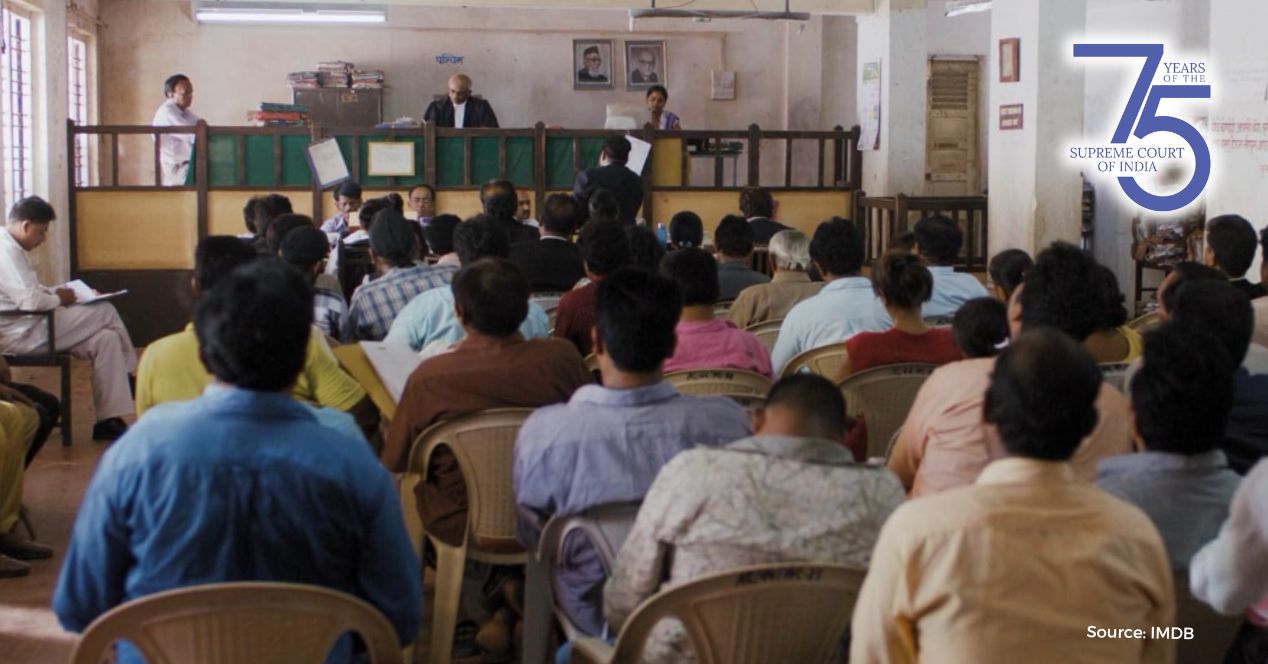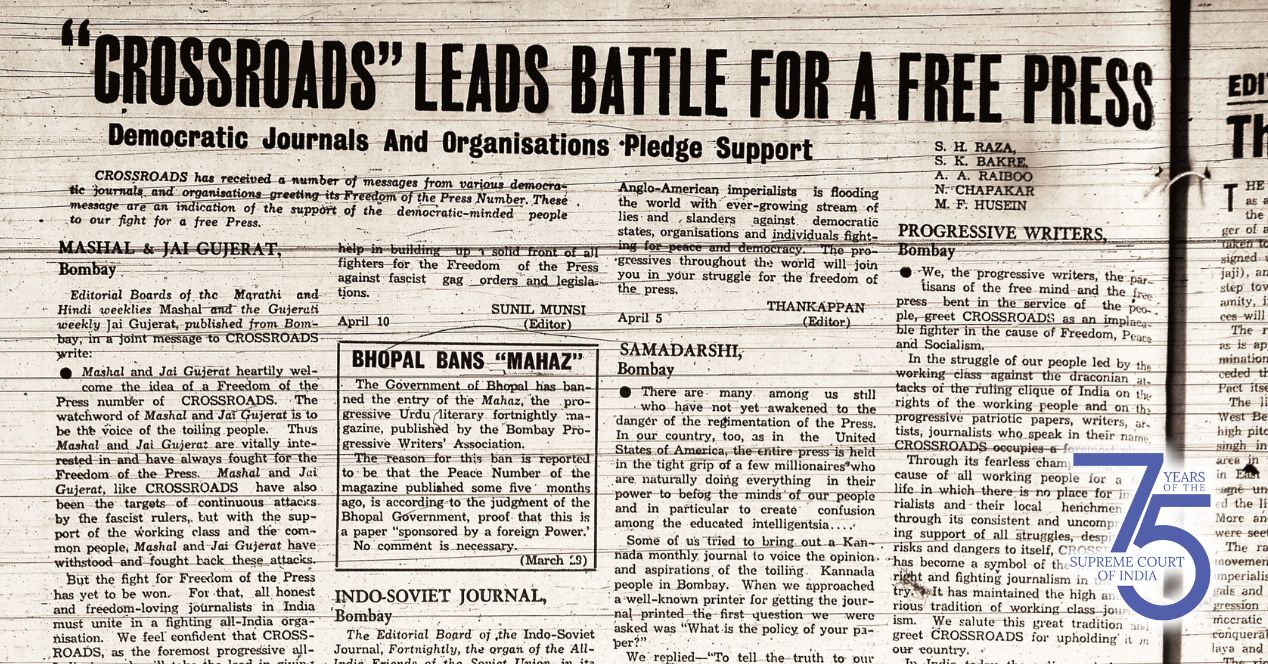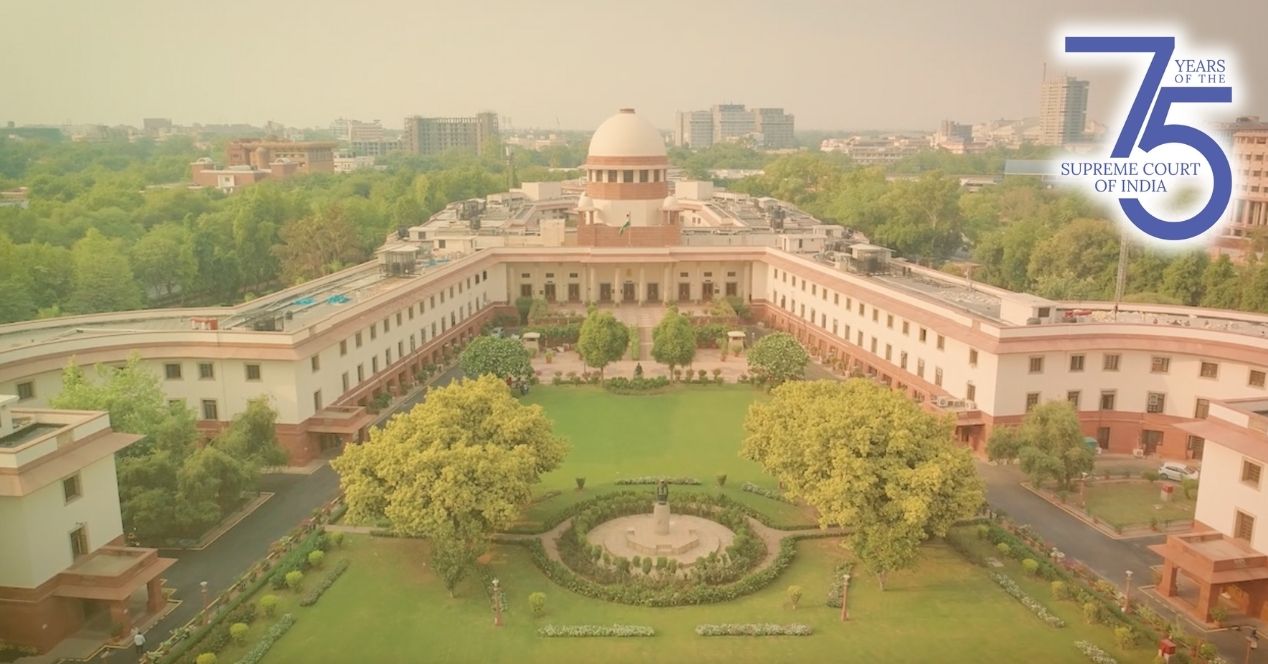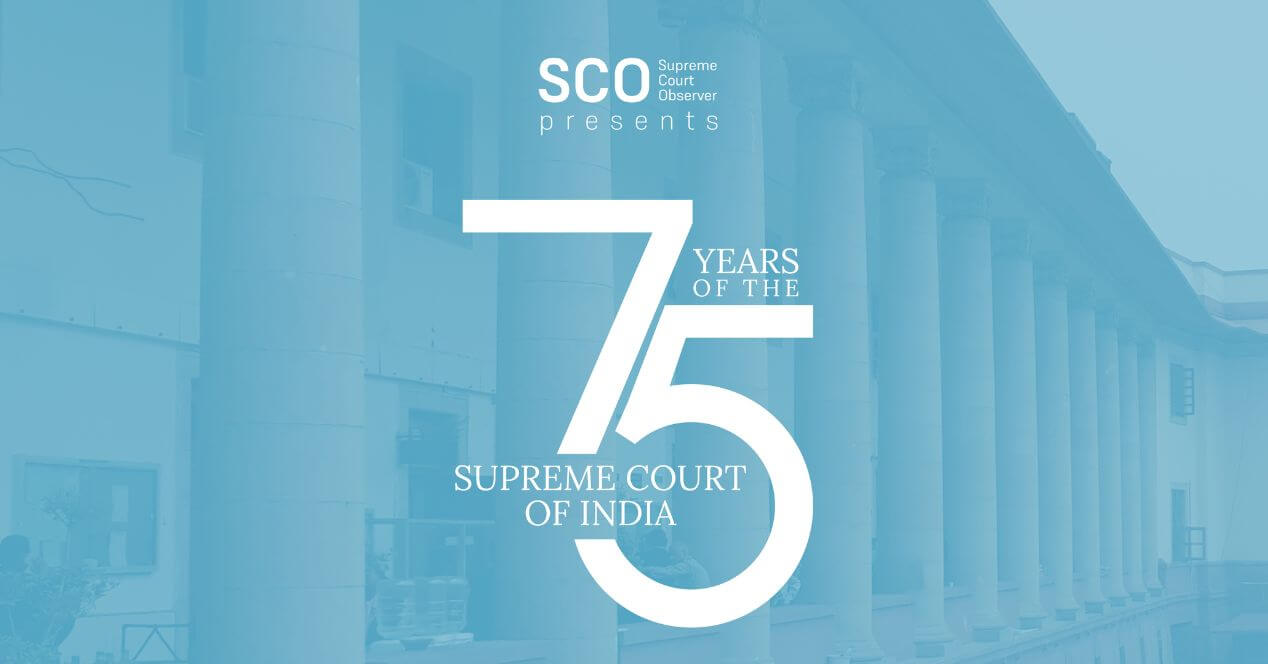Justice Kania’s inaugural speech on the establishment of the Supreme Court
In his inaugural address, the first Chief Justice said that the new Court would stay away from the ‘spirit of formal or barren legalism.'
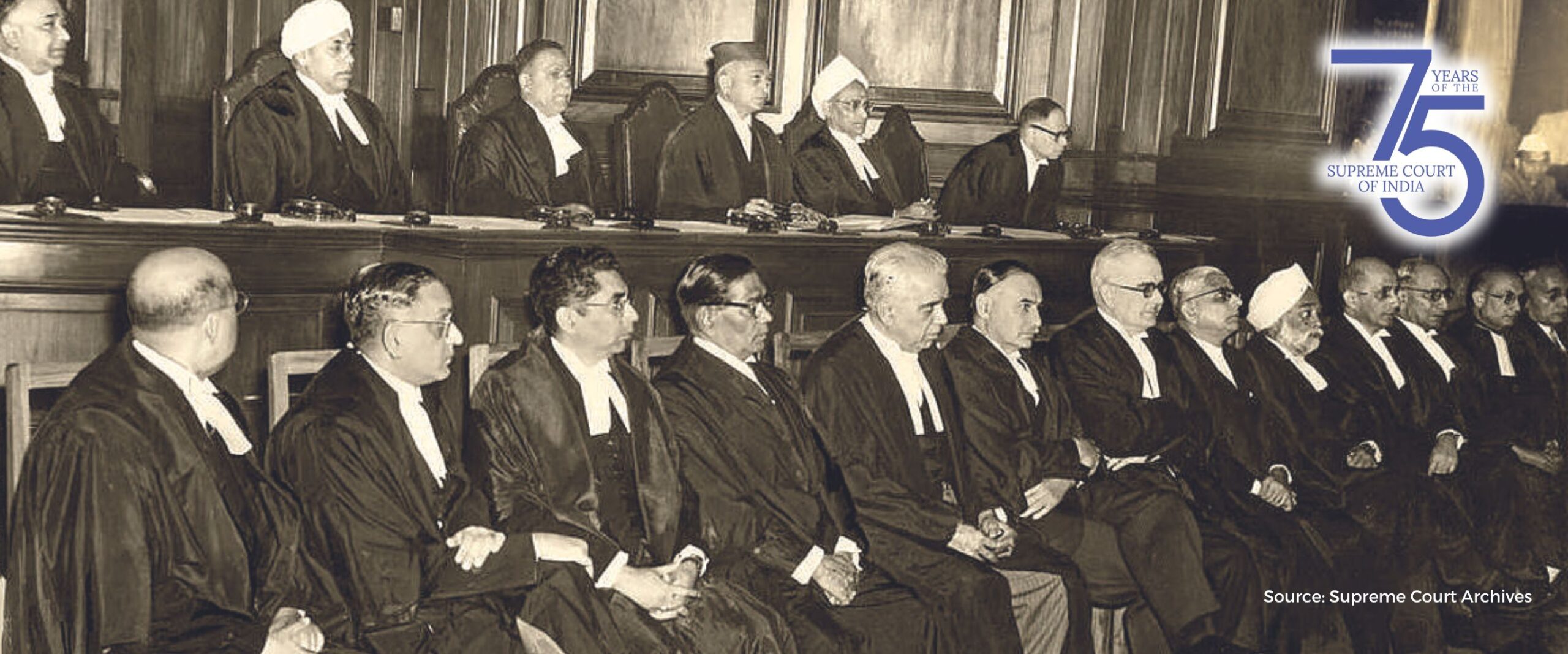
On 28 January 1950, two days after India became a sovereign democratic republic under a new Constitution, the Princes’ Chamber of the old Parliament House played host to the first sitting of the Supreme Court of India. At 9.45 a.m., the first Chief Justice of India Justice Harilal J. Kania, along with the five judges of the court—Saiyid Fazl Ali, M. Patanjali Sastri, Mehr Chand Mahajan, Bijan Kumar Mukherjea and S. R. Das—took their seats.
Among the other distinguished jurists in the chamber included the Chief Justices of all the High Courts of the country that existed in 1950. There was B.B. Malik from Allahabad, M.C. Chagla from Bombay, Arthur T. Harries from Calcutta, P. V. Rajamannar from Madras, B. Ray from Orissa, Thadani from Assam, Vivian Bose from Nagpur, Eric Weston from Punjab, Divatia from Saurashtra, Teja Singh from Patiala and East Punjab States Union, Medappa from Mysore, R.S. Naik from Hyderabad, P.K. Kaul from Madhya Bharat and Kunhiraman from Travancore-Cochin Union.
The Attorney General of India, M.C. Setalvad, was also present along with the Advocate Generals of India’s provinces. At this momentous occasion, the executive was represented by Prime Minister Jawaharlal Nehru, his deputy Sardar Patel and all the ministers of independent India’s first government. Other attendees included renowned advocates from across the country, and ambassadors and diplomatic representatives.
Here is the text of the inaugural speech delivered on the day by Harilal Kania, the first Chief Justice of India.
Mr. Attorney-General of India, we thank you for your words of welcome on the establishment of the Supreme Court of India. The presence of the Advocates-General of several States and of Advocates from different parts of India today is a compliment to the Court.
It is difficult to overestimate the significance of today’s proceedings in the constitutional development of India when we remember how the Supreme Court has come to be established and notice its functions and duties. The Federal Court was established in 1937 under the Government of India Act, 1935, in anticipation of a Federation being formed. For reasons which we need not ponder over now, the idea of Federation did not fully materialize.
With the passing of the Indian Independence Act in 1947 a great change came over the structure of the Government of India. All foreign control over the determination of issues vital to the Government of the country disappeared. The Constituent Assembly which was then sitting got the power to make laws including the power to amend the Government of India Act itself. Once that step was taken, all control from outside over the Indian Judiciary had to go. By legislation in December 1947 all direct appeals, in civil matters, to the Judicial Committee of the Privy Council were stopped from the 1st of February 1948. When the draft constitution was about to be completed in its second stage and in order that the abolition of all appeals to the Judicial Committee may be smoothly brought about, the Abolition of Privy Council Jurisdiction Act, 1949, was passed in October 1949.
Theoretically, before that in all civil and criminal matters a right of appeal to the Privy Council remained only with the leave of the Federal Court or with special leave of the Privy Council. On the ushering in of the Constitution of India that right has now also gone. The result is that the people of India have desired and established by their choice the Supreme Court as the final court of appeal for all its people. It is the final stage of the complete independence of the judicial system of the Country.
Under the Constitution of India now in force the Supreme Court has been given powers not only to decide finally the ordinary civil or criminal litigation of the land, but also to decide disputes between States and States and between the Centre and the States. In addition, powers are given to the President to refer to the Supreme Court questions of law or fact, for its opinion. A right of appeal in certain classes of criminal cases to the Supreme Court is newly created.
Finally the Court is given powers to issue high prerogative writs like habeas corpus, mandamus, certiorari and quo warranto. The last, but by no means the least, important change is a result of the formation of several Indian States into Unions, having the same status of States in the matter of their judiciary. Their High Courts have now the same position as the High Courts of other States. Appeals from them lie direct to the Supreme Court.
Clothed with the duty of performing such important functions, it is obvious that as in all democratic countries the Supreme Court should be quite untouchable by the legislature or the executive authority in the performance of its duties. No civilized democratic society can subsist and no nation can make progress if this position of the Supreme Court is not conceded and maintained. Under the Constitution of India, the Supreme Court is established to safeguard the fundamental rights and liberties of the people. An independent Supreme Court, as shown by the working of such courts in other democratic countries, will have far-reaching influence on the constitutional history and progress of the Union of India.
The Constitution of India divides the legislative Powers between the States and the Centre. It has given overriding powers to the President in case of emergency. It has tried to provide for various contingencies which can be reasonably thought of. It has tried to include within itself various features of the Constitutions of other countries in so far as they are suitable to India. The result is that different parts of the Constitution will act and react on each other and the Court will have to decide questions arising from such a situation.
As you observed, this Court will be called upon to discharge its duties as perhaps no other Court has so far been called upon to do. The only other country with so many States federating to form one Union, I believe, is the United States of America. The decisions of the Supreme Court of that great country were not frequently referred to in our courts, as a search for an authoritative statement of law on the points in controversy was made in the decisions of the Privy Council, as those decisions were binding on the courts in India. Even the obiter dicta of the Board had to be treated as authoritative. With the establishment of the Supreme Court, although the Privy Council decisions are entitled to great respect, they have ceased to have compelling binding force. The result is that the decisions of the Supreme Court of the United States of America and the jurisprudence of that country and the principles of law laid down by that Court will be perhaps more relied upon for our decisions than they have hitherto been done.
The law consists of Acts of the Legislature, Custom and Judicial decisions. While the Supreme Court will no longer be under the control or supervision of the Judicial Committee of the Privy Council and the latter’s decision will no longer be binding on this Court, the decisions of the Privy Council are bound to be treated with the greatest respect as they have become a part of the law of this country. Several judicial pronouncements of the Board are monuments of learning and written with illuminating clarity are lucid exposition of first legal principles, which will be treasured so long as our present system of law endures. The work done by that august body for Indian law will be always appreciated.
In the constitutional development of India these changes, though not noticed immediately by every man, are appreciated by many here and abroad as they have the unifying influence of the Central Judicature.
In a democratic country the people make the laws through their legislature. It is not the function of the Court to supervise or correct the laws passed by the legislature as an overriding authority. It is its function and duty to point out, when examining the acts of individuals or of the executive authority purporting to be done under some Act of the legislature, the lacuna or loopholes only with the object that, if so desired, the legislative authority may put matters right. As it is often stated, in cases of hardship the court tries its best to do justice between the parties but if a clear provision of law exists it has to administer the law and not to make one. The court is thus working always in cooperation with the legislature and at no time its work can be considered obstructive or its attitude antagonistic.
A country may be governed by an unwritten Constitution, like the British Parliament, which is supreme in every respect. Its powers are unlimited. A country, on the other hand, may be governed by a written Constitution, like the United States of America. India has chosen to have a written Constitution. The duty of interpreting that Constitution with an enlightened liberality falls on the Supreme Court. The Supreme Court will declare and interpret the law of the land and with the high traditions behind the judiciary of this country, we are convinced that the work will be done in no spirit of formal or barren legalism.
It will be our endeavour to interpret the Constitution, not as a rigid body, but as a living organism, having within itself the force and power of self-government. We trust that in doing so we shall allow the constitutional usages and conventions recognised in all civilized independent countries to be respected. The Supreme Court, however, under the colour of interpretation, cannot alter or amend the law. But within the limits prescribed we are quite sure that the Supreme Court will be able to make a substantial contribution towards the formation of India into a great unit retaining its own civilization, traditions and customs.
With the establishment of the Supreme Court of India we shall develop our own jurisprudence based on our historical background and we trust that that will be an important and useful contribution to the creation of International Law. The Federal Court as interpreting the Constitution of the country, had earned the confidence of the country. In endowing the Supreme Court of India with very wide powers, the Constituent Assembly, the Assembly representing the voice of the people through its elected representatives, has shown complete confidence in the Court as the final body for dispensing justice between individuals and also between States and States and the States and the Centre. We hope to deserve that confidence. We trust that the people of India will also maintain the independence, honour and dignity of the Supreme Court.
In order that the Supreme Court may have full assistance in its work, the High Courts will have to be strong in their personnel. Under the old legislation a fixed proportion of Judges from the Barristers and Indian Civil Service had to be maintained. That rule was repealed some time ago but the mental background still appears to exist. In the same way for some years before 1947 there was a policy to appoint members of different communities in some proportion, in the services, including the High Courts. In theory it appears to be now accepted that appointments will be only on merits. The policy however does not appear to have been completely abandoned. We hope that political considerations will not influence appointments to High Courts. It is necessary that for the High Court merit alone should be the basis for selection if the High Courts have to remain strong and independent and enjoy the confidence of the people.
Before the establishment of the Sovereign Democratic Republic of India, the relations between the Government and the Court were regulated by conventions. They have been established as a result of experience of several decades and were the basis of keeping the judiciary free from interference by the executive. One of the conventions was that the Chief Justice should be consulted before the appointment of a High Court Judge. It was understood that if the Chief Justice did not approve of an appointment, it was not made by the Government. Under the Constitution of India we believe a statutory recognition is given to this convention by providing that the Chief Justice of India will be consulted before the appointment of a High Court Judge.
The establishment of the Supreme Court gives to the people justice nearer at hand and at a relatively smaller cost. The jurisdiction of the Supreme Court is now practically over the whole of India. Such jurisdiction, extending over such a vast area, with the multiple powers given to the court, will require in course of time more judges. On the rapid achievement of Independence wide gaps were left in the judicial service and several members of the Bar have been appointed Judges of High Courts in the last two years. This has made fresh recruitment to the Bench more difficult and the process of expanding the Supreme Court will have to be slow.
To maintain the high standard of our Judiciary recruitment from the Bar is the normal channel. You have assured us of the cooperation of the Bar in the administration of justice. Over thirty years ago, the offer of a judgeship to a member of the Bar was considered a high honour and the culminating apex of his career as a lawyer. A judge was respected by the people and by the Government. His position and status were recognized in all spheres. In those days, as you mentioned, everyone’s attitude towards the court was of adoration and almost of worship. That honour and the life of comparative ease were considered sufficient compensation to balance the financial loss which a good practitioner suffered by accepting a judgeship.
Unfortunately, during the last twenty years, that respect for the position, status and dignity of the judge has not been fully maintained. Without any compensatory benefit or advantage, it is difficult to persuade a good practitioner to accept a judgeship. We hope and trust that with the inauguration of the Republic the honour due to the position and status of a judge of a High Court and Supreme Court will be fully restored. Unless leading members of the Bar accept judgeships it will be difficult to strengthen the Bench and the hopes of producing great judges may not be realised.
Experience has shown that no court can perform its duty to the satisfaction of all concerned unless it is assisted by a strong, intelligent and industrious Bar. We have heard with pleasure your assurance of such assistance and complete cooperation in the administration of justice. We hope that with the realisation of the value of independence, which the country has achieved politically, such co-operation will be forthcoming from all other quarters also. The Indian Bar has maintained the High traditions of the profession. Different conditions in different Provinces have so far prevented the creation of one Bar with one good reliable standard of advocacy, knowledge and etiquette.
With the inauguration of the Independent Republic of India and the States Union Courts attaining the status of the States High Courts, one can look forward in time to the existence of one Bar for India, with a very high standard of efficiency to assist the courts in the administration of justice. When India and the world are passing through the transitional stage and travelling along somewhat uncertain paths of peace the profession of law is very important in the structure of the society. The lawyers equipped with knowledge of law are expected to fight for the freedom of the citizen and also the maintenance of law and order. While in the name of Independence confusion or disorder in society cannot be permitted, the lawyers’ profession will naturally resist encroachments attempted in the name of law and order on the liberty of the subject and on fundamental human rights. The profession of law, with the inauguration of the Republic of India, has thus also to discharge a more onerous obligation, which we are quite sure it is capable of and will be willing to do.
The standard of the Bar of the State Unions will have to be raised considerably. More study and greater industry will be required of them. Unless the Bar makes a determined effort to raise its standard they will not be useful to the court in arriving at correct decisions. The decisions of the courts of those States will come for examination before the Supreme Court and unless the standard, knowledge and efficiency of the Bar are increased, defects in the conduct of the case and ignorance of law, which may have caused failure of justice to the parties, will be noticed and naturally, come in for criticism.
The Supreme Court, an all-India Court, will stand firm and aloof from party politics and political theories. It is unconcerned with the changes in the government. The Court stands to administer the law for the time being in force, has goodwill and sympathy for all, but is allied to none.
Occupying that position we hope and trust the Court will maintain the high traditions of the nation, and in stabilizing the roots of civilization which have twice been threatened and shaken by two world wars, and maintain the fundamental principles of justice which are the emblem of God. We hope and trust the Court will maintain the high traditions of the Judiciary and perform its duties without fear or favour. If we succeed in doing so we shall contribute our share to the progress of the Republic of India and render a service to the country which none else can render. The presence of the Chief Justices of different States of the Union of India and of the Advocates of this Court, who are also Advocates of different High Courts, on this occasion gives us encouragement to cherish such hopes. We hope that we shall have frequent occasions to contact the Supreme Courts of other independent countries so that with the exchange of views the high standard of our Judiciary may be further strengthened.
Before concluding I should like to read to you a message which I have received from the Lord Chancellor of England on this occasion.
“May I send you and your brother Judges may sincere good wishes for the success of your Court?
It is satisfactory to think that notwithstanding all the difficulties of the day we are all determined to maintain and strengthen the rule of law and I feel quite confident that the Supreme Court of India will prove an effective instrument for this end.
I like to think that you share with us common traditions and I feel sure that we shall each gain strength and wisdom from the development of each other’s jurisprudence.
I will do everything I can to maintain the closest contact with your Court and with its Judges and I hope that from time to time we may have the opportunity of meeting them either here or in your country.
Please convey on behalf of myself and all the Judges of our Supreme Court the very best wishes to you all on the auspicious occasion”.
May God grant us the strength and wisdom to discharge the duties and functions of the Court.
We are grateful to the Supreme Court of India for their permission to republish the first Chief Justice’s speech here as part of our “75 Years of the Supreme Court of India” special series.

